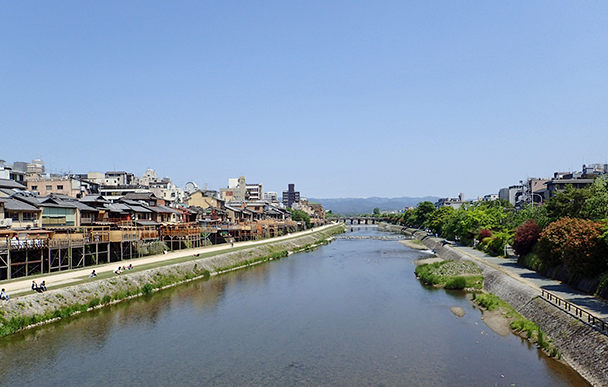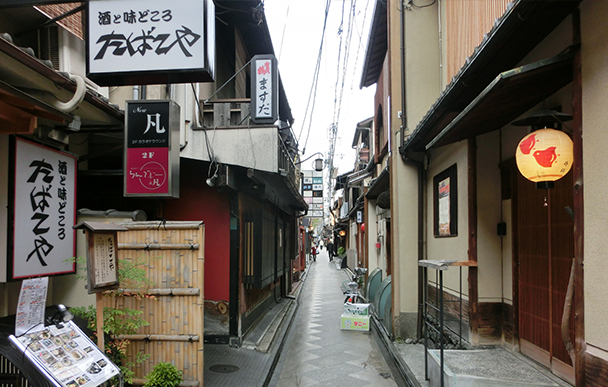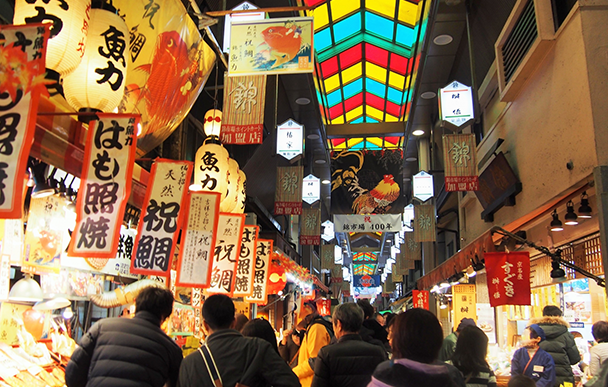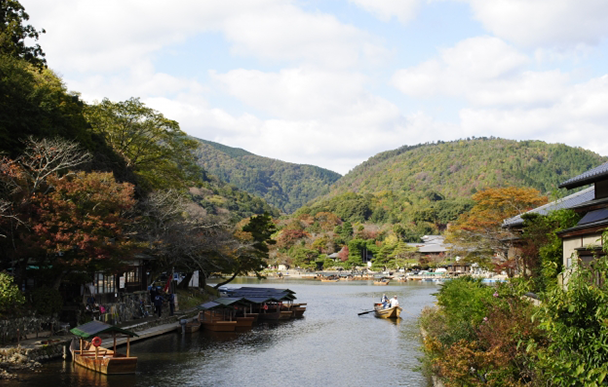

Kyoto, the ancient capital, where renowned temples and shrines coexist with traditional
cityscapes.
Whether it's visiting shrines and temples, enjoying art, or shopping, everyone has their own way of experiencing
Kyoto. With an abundance of captivating spots, find the perfect stay that suits you.
A narrow street developed in the early Meiji period, stretching about one kilometer from Sanjo Street in the north to Kennin-ji Temple in the south. Along the street, you'll find various facilities and shops, ranging from traditional Kyoto landmarks like temples and tea houses to bars and izakayas.

A river that flows approximately 33 km north to south through Kyoto City. It is popular as a relaxing spot and a date destination, allowing visitors to experience the seasonal charm of Kyoto.

One of Kyoto's five geisha districts, Pontocho is a narrow alley about 600 meters long that stretches along the Kamo River from Shijo Street to Sanjo Street. It is lined with various dining establishments, including traditional restaurants.
Opened in April 1903 with donations from citizens and city funds, it is the second oldest zoo in Japan. The zoo houses about 600 animals of around 160 species and also features an animal library.
The museum houses approximately 300,000 items (as of 2016), focusing on contemporary domestic manga, historical materials related to manga from the Meiji period onwards, renowned manga from around the world, magazines, and animation-related materials.

The Nintendo Museum, which opened on October 2, 2024, is a facility where visitors can learn about and experience the history of entertainment through numerous products released by Nintendo, beloved across generations and borders.

A bustling shopping street known as the "Kitchen of Kyoto," stretching 390 meters long. This vibrant market features representative Kyoto flavors, including Kyoto pickles, Kyoto vegetables, yuba (tofu skin), fresh wheat gluten, and obanzai (traditional side dishes).
With the concept of "Connecting Life with Water," this aquarium offers experiences by the waterside, making it a popular spot for both children and adults.

Home to various attractions, including the Togetsukyo Bridge over the Katsura River, stunning bamboo groves, Nonomiya Shrine, and Japan's oldest landscape-style garden.
An old stone bridge spanning the Shirakawa River at the lowest point, located on Yamato Oji Street (Nawate Street). Traditional shops and tea houses line the area, offering a quintessential Kyoto atmosphere.
The head shrine of approximately 3,000 Yasaka shrines across the country. The Gion Matsuri, one of Japan's three major festivals, is held in honor of Yasaka Shrine. The main hall and the west gate are designated as Important Cultural Properties of Japan.
Said to be the oldest Zen temple in Kyoto, it was founded by Zen Master Eisai, known as the father of tea in Japan. Highlights include the vibrant replicas of the Wind God and Thunder God, as well as the powerful twin dragon painting in the Hōdō (Dharma Hall). The "Shōon-tei" garden, beautifully harmonized with green moss and blue leaves, is a highlight that can be viewed from all directions.
Founded in 1895 to commemorate the 1,100th anniversary of the transfer of the capital to Kyoto, this shrine is a popular spot that offers beautiful views in all seasons.
A famous tourist spot with many well-known attractions. It attracts numerous visitors year-round. In 1994, it was registered as a UNESCO World Heritage Site as part of "Historic Monuments of Ancient Kyoto."
Established in 1606 by Nene, the northern consort of Toyotomi Hideyoshi, to commemorate her husband. Highlights include the garden designed by Kobori Enshu and the tea house and umbrella pavilion inspired by Sen no Rikyū.
The head temple of the Jodo sect, founded by Honen Shonin. It features one of Japan's largest wooden Sanmon gates and is famous for its New Year's Eve bell. The temple grounds are home to 106 various buildings of different sizes.
The head temple of the Nanzen-ji branch of the Rinzai sect. Notable features include the Sanmon gate, the brick aqueduct, and the Hōjō garden.
Built by the 8th shogun Ashikaga Yoshimasa, it symbolizes the Higashiyama culture, evoking a sense of "wabi-sabi" (the beauty of simplicity and imperfection).
Constructed by the 3rd shogun Ashikaga Yoshimitsu as a retreat. It is registered as a UNESCO World Heritage Site. The reflection of the golden pavilion in the Mirror Pond is a stunning sight.